Is the media biased against Nigel Farage?
[dropcap]I[/dropcap]t appears that Nigel Farage has put his foot in it again. In a documentary to be aired next week, he will state that laws against racial discrimination would be scrapped under a UKIP government, another move in a continued cycle of measures designed to segregate anyone who is not white or British. Employers will be able to sack someone for being black, and we will be one step backwards, returning to a Britain of the past. Obviously, something needs to be done to prevent this horrible racist bigot from getting into power.
Except, despite this being the picture presented by the media, and the line of attack that other politicians used to attack the UKIP leader, this is not exactly what happened. Whilst filming a documentary entitled Things We Won’t Say About Race That Are True, former head of the Equalities and Human Rights Commission Trevor Phillips interviewed Farage. Farage, when discussing employment regulation, said that he found it ‘ludicrous’ that British firms are unable to discriminate between Polish and British workers, the reasoning for this being EU regulation.
Phillips then asked him specifically if he would like to retain a ban on discrimination on the grounds of race or colour – Farage said no, stating that the party has the view that it (and, it is implied, the public) is colour-blind. When asked about the possibility of people losing out on jobs solely because of their race, Farage didn’t think it likely, thinking it more a problem that would afflict of the Britain of forty years ago. He thinks that if he talked about the race issue with his child, the child wouldn’t even know what he was talking about.
Examples of the issue mentioned by Farage are everywhere. A Labour council in Carmarthenshire is advertising for Polish-speaking ‘recycling operatives,’ saying that as a majority of its workers are Poles and that there are safety concerns, this skill would be advantageous. The implication here is that a Polish worker would be hired over a British worker, and to Farage, this is absurd when this discrimination can’t work the other way.
Now, I don’t intend to mount a defence of Farage’s views, but rather look at the reaction to it.
The worst coverage here, perhaps somewhat unsurprisingly, came from the BBC. It ran it as its prime story, with a headline stating that Farage intended to stop discrimination at work. This evolves into the assertion that Farage would scrap ‘much of’ the race discrimination legislation currently active. The article, though, makes a number of assertions that it contradicts later in the same article.
This theme has run through a number of articles on different news websites, including a fairly horrific one leading with the idea that ‘No Blacks is Now UKIP Policy,’ something misleading and defamatory to the extreme (likely linked to a comment I’ll discuss later).
Less shocking is the other parties’ reactions to this – it’s an unwritten rule that politicians need to tear down other parties’ views or responses to anything (particularly with UKIP, which every party is afraid of). The Tories likened Farage to Goebbels, with David Cameron condemning the call to scrap equalities legislation as ‘wrong and frankly pretty appalling.’
Labour’s response, embodied by Sadiq Khan, was that Farage wanted to turn the clock back to a time when boarding houses displayed signs reading ‘No blacks, no dogs, no Irish,’ even though he understands perfectly that this is not what Farage is proposing.
However, when Gordon Brown was in power and was promising British jobs for British people, the same man didn’t seem to have a problem with it.
There are certainly grounds for attacking Nigel Farage, but deliberately misinterpreting his comments and then reporting the misinterpretation as fact in order to do so is wrong, and to see it presented as news is quite worrying. This approach simply amounts to pointing and shouting ‘RACIST.’ This act immediately kills any sensible discussion about the topic and plays into UKIP’s hands by presenting them as a party willing to talk about an issue that concerns the electorate. However, a skewering of UKIP no matter what is the narrative game that the media wants to play, regardless of the factual basis.

Comments